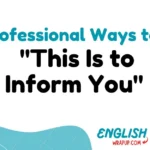Idioms are the spice of language, adding flavor and depth to our communication. They convey meaning beyond the literal words, often capturing cultural nuances and shared understandings that make interactions more engaging and dynamic.
In this article, we’ll explore 25 alternative ways to say “As you know,” enriching your vocabulary and making your conversations more vibrant and effective.
Is it Professional to Say “As You Know”?
Appropriate Contexts
- Established Relationship: If you have an ongoing professional relationship with the recipient and you’re certain they have the background information you’re referring to, it can be appropriate and efficient.
- Example: “As you know, our team has been working on the project since last quarter.”
- Reaffirming Shared Knowledge: When you need to build on shared knowledge to make a point or progress a conversation.
- Example: “As you know, our sales have increased by 20% this year, which allows us to expand our marketing efforts.”
Potential Pitfalls
- Assuming Knowledge: If the recipient might not actually know the information, using this phrase can come off as presumptuous or even dismissive.
- Example: “As you know, the policy changed last month” might be problematic if the recipient is unaware of the change.
- Condescending Tone: In some contexts, “As you know” can inadvertently come across as patronizing.
- To avoid this, ensure your tone is respectful and consider rephrasing to “You might remember” or “You might be aware.”
Alternatives
- Explicitly State the Information: Instead of assuming the recipient knows, provide a brief summary.
- Example: “As you may recall, our team has been working on the project since last quarter.”
- Rephrasing: Use phrases that soften the assumption.
- Example: “You might remember that our team started the project last quarter.”
Example Scenarios
- Email to a Colleague:
- Acceptable: “As you know, we’ve been focusing on improving our customer service.”
- Improved: “You might remember that we’ve been focusing on improving our customer service.”
- Report to Management:
- Acceptable: “As you know, the market trends have shifted significantly this year.”
- Improved: “You are likely aware that the market trends have shifted significantly this year.”
In summary, while “As you know” can be professional in the right context, it is essential to ensure it is used appropriately to avoid misunderstandings or unintended negative tones.
List of Professional Ways to Say “As You Know”
- As you are aware
- As you may recall
- As you might remember
- As you have heard
- As you’re probably aware
- As previously mentioned
- As previously discussed
- As we discussed
- As it has been said
- As it is known
- As noted earlier
- As mentioned earlier
- As you’ve seen
- As indicated before
- As it’s been pointed out
- As stated before
- As is well-known
- As commonly understood
- As you can imagine
- As we both know
- As is evident
- As is recognized
- As established
- As has been demonstrated
- As you will remember
As you are aware
“As you are aware” is a polite and formal way to acknowledge shared knowledge or information. It is often used in professional settings to reference previously discussed topics.
Example:
“As you are aware, the deadline for the project submission is next Friday.”

As you may recall
“As you may recall” gently prompts the listener to remember something that was mentioned earlier. It’s a diplomatic way to refresh someone’s memory without assuming they have forgotten.
Example:
“As you may recall, we decided to allocate additional resources to the marketing campaign.”
As you might remember
“As you might remember” is similar to “as you may recall,” used to jog the listener’s memory about a past conversation or event.
Example:
“As you might remember, we discussed this issue in our last meeting.”
As you have heard
“As you have heard” acknowledges that the listener is likely already informed about the topic through previous conversations or announcements.
Example:
“As you have heard, the company is planning to expand its operations overseas.”
As you’re probably aware
“As you’re probably aware” suggests that the information is common knowledge or widely known among those involved.
Example:
“As you’re probably aware, the new policy will be implemented starting next month.”
As previously mentioned
“As previously mentioned” refers back to something that has already been brought up in conversation or written communication.
Example:
“As previously mentioned, we will be conducting the annual review next quarter.”
As previously discussed
“As previously discussed” is used to reference earlier conversations or meetings where the topic was covered.
Example:
“As previously discussed, the budget has been approved and we can move forward with the project.”

As we discussed
“As we discussed” directly references a specific conversation between the speaker and the listener.
Example:
“As we discussed, I will be handling the client presentation next week.”
As it has been said
“As it has been said” implies that the information has been stated before, often referring to a known fact or commonly held belief.
Example:
“As it has been said, teamwork is crucial for the success of any project.”
What Are The Collective Nouns for “Ants”
As it is known
“As it is known” suggests that the information is widely recognized or accepted as true.
Example:
“As it is known, our company has always prioritized customer satisfaction.”
As noted earlier
“As noted earlier” brings attention to something that was highlighted or pointed out previously.
Example:
“As noted earlier, we need to finalize the report by end of day tomorrow.”
As mentioned earlier
“As mentioned earlier” refers back to a point that was previously brought up in the discussion or text.
Example:
“As mentioned earlier, the software update will be available next week.”
As you’ve seen
“As you’ve seen” acknowledges that the listener has already been exposed to the information or event being referenced.
Example:
“As you’ve seen, our new advertising campaign has generated a lot of interest.”
As indicated before
“As indicated before” points back to prior statements or evidence provided earlier in the conversation or document.
Example:
“As indicated before, the sales figures have been steadily increasing.”
As it’s been pointed out
“As it’s been pointed out” highlights that the information has been emphasized or noted previously.
Example:
“As it’s been pointed out, we need to focus on improving our customer service.”
As stated before
“As stated before” refers to a previous statement, reinforcing the information shared earlier.
Example:
“As stated before, we will be implementing a new training program for all employees.”
As is well-known
“As is well-known” implies that the information is widely recognized or understood by everyone involved.
Example:
“As is well-known, our company has a reputation for innovation.”
As commonly understood
“As commonly understood” suggests that the information is generally accepted or agreed upon by most people.
Example:
“As commonly understood, regular maintenance is essential for the longevity of our equipment.”
As you can imagine
“As you can imagine” invites the listener to consider the information in the context of their own experiences or expectations.
Example:
“As you can imagine, the upcoming merger will bring significant changes to our organization.”
As we both know
“As we both know” acknowledges shared knowledge between the speaker and the listener, reinforcing a sense of mutual understanding.
Example:
“As we both know, the client is very particular about deadlines.”
As is evident
“As is evident” points out something that is clear or obvious based on the information available.
Example:
“As is evident, our marketing strategy has been very successful this quarter.”
As is recognized
“As is recognized” implies that the information is officially acknowledged or accepted.
Example:
“As is recognized, our partnership with local businesses has been beneficial for the community.”
As established
“As established” refers to information or facts that have been previously confirmed or agreed upon.
Example:
“As established, we will be moving forward with the new project timeline.”
As has been demonstrated
“As has been demonstrated” points to evidence or examples that have previously shown or proven the information to be true.
Example:
“As has been demonstrated, effective communication is key to successful project management.”
As you will remember
“As you will remember” prompts the listener to recall specific information from past interactions or communications.
Example:
“As you will remember, we agreed to review the budget proposals in our next meeting.”
Final Thoughts
Idioms like these enrich our language and communication, providing a variety of ways to convey shared understanding and reference past information.
They help us to be more precise, engaging, and expressive in our interactions, whether in professional settings or casual conversations.

I’m Ava Thompson, your expert guide at “English WRAP Up.” I’ve been immersed in the world of English language tests, helping students ace TOEFL, IELTS, BULATS, FCE, CAE, and PTEG. With a wealth of experience in teaching and grading, I’m here to help you master your English exams. Join me on this educational journey, and let’s wrap up your English skills with excellence!



